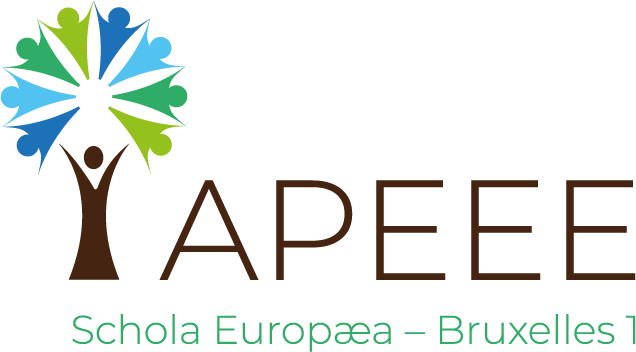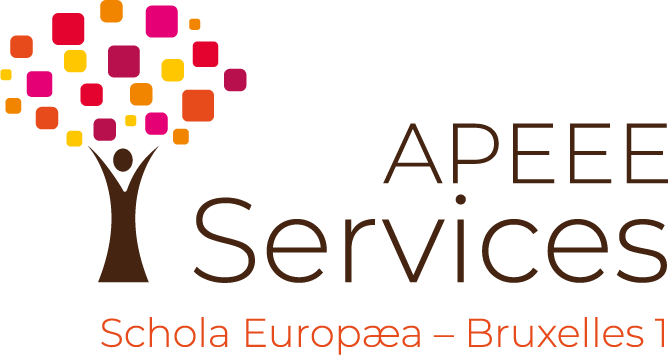Mobile Phone Policy
Primary Interlocutor: Well-Being Working Group
In response to concerns raised by parents at the beginning of the 2018-2019 school year about the use of smartphones in the school and the current very light mobile phone policy, the APEEE launched a wide consultation with parents concerning their views on updating the policy. (See Annex of position paper for background to the consultation and the current mobile phone policy at EEB1 and other schools.) Based on the responses received from all eight language sections, the APEEE Board adopted with overwhelming support the following proposal for an update of the mobile phone policy at its meeting in January 2019. The proposal was immediately forwarded to the school direction, and a working group was eventually set up by teachers in February 2020 with the inclusion of parents and students. We still await the fruits of this work.
APEEE Proposal
The school's policy should include the following elements:
- Definition of what devices are covered by the policy (mobile phones/smart watches/tablets/music players/other electronic devices); use of headsets should also be covered. Exception should be made for e-readers.
- Clarity about responsibility for mobile phones/screen devices brought to school.
- Separate policies for primary and secondary cycles.
- Differentiated treatment of the lower years of secondary (S1- S3) and the upper years of secondary (S4-S7); some flexibility for S1-S3 and fewer restrictions for S4-S7.
- Exception where required for children with Special Educational Needs.
- Clarity about where and when mobile phones/screen devices may be used on the premises.
- Proportionate and clear consequences for use of mobile phones in class and elsewhere when not permitted.
- Clear privacy rules concerning images/recordings of individuals and the school premises:no taking of images/recordings of any individual without their permission and no sharing of such images/recordings without the individual's permission. This should apply to any person on the school premises. Exception for images/videos taken in the community interest.
- Rules should be communicated clearly to staff, parents and students, e.g. via website, school information booklets.
- The policy on mobile phones/electronic devices, including privacy rules, should form part of the code of conduct that students are required to sign.
- Staff should set an example of reasonable and moderate device use.
Primary: Students should be discouraged from bringing phones/electronic devices. If a student brings a phone to school it must be switched off all day until after the last bell, when it may be switched on, e.g. for communication with parents. No devices of any description may be used in class or during breaks unless there is a special exemption on SEN grounds. Teachers should not promote/encourage the use of mobile phones in the primary cycle.
Urgent communication with parents in primary during the school day should continue to be via the school. At the teacher's discretion in exceptional cases, e.g. to arrange an urgent medical appointment, a phone may be switched on during the school day to communicate with parents.
Secondary: For the entire secondary cycle, playing games or using social media should not be permitted during school hours. The use of a device to make brief telephone calls should be permitted across the cycle. The establishment of no-phone zones to apply to everyone (students, staff and visitors) should be considered, e.g. the Platon circle/library area and the ballgame area between Erasmus/Platon.
- S1-S3: Mobile phones/electronic devices may be brought to school but the phone should in principle remain switched off during school hours (from first bell to last bell). Devices must be switched off in class but may be used for pedagogical reasons when permitted by the teacher, e.g. as a calculator or to take a photo of slides etc. Exemptions in justified cases (e.g. to arrange urgent medical appointments) should be possible.
There should be some flexibility to permit S1-S3 to use smartphones briefly in a dedicated space to check for messages and to use a device for pedagogical reasons (e.g. research or language learning, re-reading notes or preparing homework).
- S4-S7: Given that this age group has more reasons for pedagogical use of devices, there should be specific zones where use of devices is be permitted, e.g. café, library (for pedagogical reasons). In addition, tablets and laptops should be permitted more widely provided they are used for pedagogical reasons.
Enforcement: Enforcement of the rules should be effective while not being detrimental to the other tasks and responsibilities of staff. A balance must be struck between the competing needs and interests, and a common-sense approach should be taken that ensures protection of children's welfare while permitting reasonable use of mobile phones on campus. The objective should be to get students, parents and staff on board with establishing a culture of reduced device use rather than the imposition of harsh disciplinary rules; to this end, the opinion of the CdE on enforcement of the policy should be taken into account. As a first step students should be asked by staff to turn the device off and put it away, with confiscation being a last resort.
Awareness-raising: We would strongly support a greater focus on educating students about the dangers of devices, internet and apps (privacy, data protection aspects, health impact, staying safe online, dealing with inappropriate content (e.g. of a violent or sexual nature), cyberbullying, etiquette, responsible use of mobile devices). Parents should take an active role in the process and good practices should be promoted by the school and shared with parents, e.g. concerning ways of introducing mobile phones and promoting responsible use. The APEEE would welcome the opportunity to collaborate on awareness-raising activities and dissemination of information.
Going forward: It is important that students (CdE), teachers, parents (APEEE) and school management are all involved. Parents would appreciate feedback on implementation and a two-way dialogue on ongoing improvement of the policy. Given the speed at which technology changes, the policy should be reviewed regularly (e.g. every two years).
Supporting Documents
![]() APEEE: Position Paper on the EEBI Mobile Phone Policy with Annex (January 2019)
APEEE: Position Paper on the EEBI Mobile Phone Policy with Annex (January 2019)
![]() OSGES: A digital tool for teaching learning and assessment in mathematics and sciences / Un outil numérique pour l'enseignement l'apprentissage et l'évaluation en mathématiques et en sciences / Ein digitales Hilfsmittel für Unterricht, Lernen und Beurteilung in Mathematik und Naturwissenschaften, v.2 (2020-01-D-76; February 2020) - EN / FR / DE
OSGES: A digital tool for teaching learning and assessment in mathematics and sciences / Un outil numérique pour l'enseignement l'apprentissage et l'évaluation en mathématiques et en sciences / Ein digitales Hilfsmittel für Unterricht, Lernen und Beurteilung in Mathematik und Naturwissenschaften, v.2 (2020-01-D-76; February 2020) - EN / FR / DE
![]() OSGES: Guidelines for the pedagogical use of mobile devices in the European Schools / Directives pour l'utilisation pédagogique des appareils mobiles aux Ecoles européennes / Leitlinien für den pädagogischen Einsatz mobiler Geräte an den Europäischen Schulen, v.2 (2020-01-D-14; April 2020) - EN / FR / DE
OSGES: Guidelines for the pedagogical use of mobile devices in the European Schools / Directives pour l'utilisation pédagogique des appareils mobiles aux Ecoles européennes / Leitlinien für den pädagogischen Einsatz mobiler Geräte an den Europäischen Schulen, v.2 (2020-01-D-14; April 2020) - EN / FR / DE
![]() EEBI Secondary: Geogebra (08 December 2020) - EN / FR
EEBI Secondary: Geogebra (08 December 2020) - EN / FR
See also: Well-Being Working Group and Pedagogical Working Group (PedGroup)
Last update: 11/05/2021



